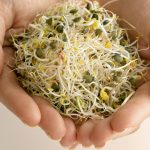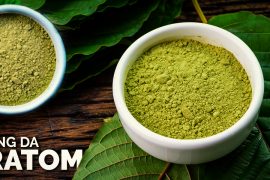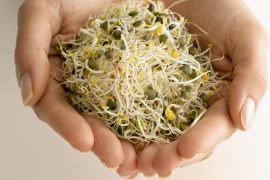Vitamin B7, more commonly called vitamin, is a B vitamin. Like most of the B-type vitamins, biotin assists the body in breaking down fats, carbs, and proteins for energy generation. Additionally, it has roles in maintaining healthy skin, hair, and nervous system function.
Read this post to learn more about the possible health benefits of biotin.
What’s Biotin (Vitamin B7)?
Biotin, also known as vitamin B7, is a water-soluble naturally-occurring vitamin crucial for the growth and development of organisms.
As a coenzyme of carboxylase enzymes, vitamin B7 is involved in the metabolism of fatty acids, amino acids, and carbohydrates.

Biotin has been shown to be important for many health variables including supporting neurological purposes, steadying blood sugar levels, DNA equilibrium, and hair, skin and nail health.
The body cannot synthesize vitamin B7, therefore it needs to be obtained regularly from the diet and intestinal germs.
Biotin can be found in a vast array of foods including animal liver, egg yolk, cow milk, and some fruits and veggies.
Though vitamin B7 deficiency is rare, it can be dangerous if left untreated. Suboptimal amounts or marginal deficiencies, which are far more common, have been connected to a number of negative health consequences including growth retardation, neurological disorder, hair loss, skin rash, muscle pain, and anemia.
Groups at risk for biotin deficiency include smokers, alcoholics, pregnant women, and individuals with inflammatory bowel disease (IBD).
Pharmacokinetics
Cosmetic vitamin B7 nutritional supplements are completely absorbed even at large pharmacological doses (81.9 micromoles taken orally or 18.4 micromoles taken orally).
Biotin is absorbed via a sodium-dependent multivitamin transporter (SMVT) from the small and large intestines.
After transport from the intestines to the systemic circulation, biotin is consumed from the liver and finally crosses the blood-brain barrier into the central nervous system.
Soon after oral ingestion by humans, single high doses of biotin (600 micrograms and 900 micrograms) are eliminated from the circulation leading to a substantial increase of urinary excretion. Therefore, for prolonged maintenance of blood glucose levels, lower dosages (300 micrograms) daily per week are recommended.
Roughly half of those absorbed vitamin B7 extends metabolism to bisnorbiotin and biotin sulfoxide before excretion. Vitamin B7, bisnorbiotin, and biotin sulfoxide are present in molar ratios of approximately 3:2:1 in human blood and urine.
The removal half-life time of biotin is roughly 1 hour, 50 minutes.
Health Benefits of Biotin
Powerful for:
1) Energy Metabolism
Biotin is a coenzyme for carboxylases, the enzymes which assist in the metabolism of fats, proteins, and carbohydrates for energy generation.
These enzymes Are Crucial for the following processes:
- Gluconeogenesis, the metabolic pathway that produces sugar out of non-carbohydrate sources such as amino acids.
- Mobile energy production.
- The use of branched-chain amino acids (e.g., leucine, isoleucine, and valine) for neurotransmitter production and energy.
- Synthesis and breakdown of fatty acids for energy.
- Insulin discharge.
Inadequate vitamin B7 amounts in the body can slow down metabolism, which might lead to exhaustion, digestive problems, and weight reduction.
2) Brain Function
Biotin is required for myelin sheath formation, a fatty substance that surrounds nerves and facilitates nerve impulse conduction. As such, biotin deficiency may delay myelination.
Biotin deficiency may also lead to a number of other neurological disorders, such as seizures, lack of muscle coordination, learning disabilities, hallucinations, melancholy, and migraines. The majority of these states can be solved with biotin supplementation.
High-dose biotin supplementation (5-10 mg/kg/day) was also helpful in treating biotin-responsive basal ganglia disorder, a rare brain metabolic condition characterized by seizures, confusion, and abnormal coordination, in a report on 18 cases.
Multiple sclerosis is an autoimmune disease characterized by myelin loss and damage. Considering its role in fatty acid synthesis and energy production (both are necessary for myelin repair and axonal survival), it’s been proposed that supplementation may succeed in reversing or limiting numerous sclerosis-related impairments.
In reality, 2 clinical trials on 177 individuals discovered that high-dose vitamin B7 treatment managed to reverse disease progression and improve symptoms in patients with advanced multiple sclerosis. On the other hand, the treatment had little or no efficacy in improving visual acuity in a different trial on 93 people with multiple sclerosis.
3) Immune System Role
Vitamin B7 is needed for white blood cell growth and its deficiency is linked to impaired immune function and an increased risk of infection.
It increases the production of Th1 cytokines like IL-1β and IFN-γ, which can be essential for eliciting an immune response to fight viral and bacterial diseases.
Inadequate levels of vitamin B7 are associated with diminished antibody synthesis, T mobile decay, and reduced amounts of spleen cells and T cells from both animals and humans.
Decreased rates of cellular proliferation throughout biotin deficiency may account for some of these adverse effects on immune function.
A deficiency of the biotinidase, a molecule that helps recycle biotin, is related to chronic vaginal candidiasis and is treatable with biotin supplementation. Since 1 in every 123 people is thought to be biotinidase-deficient, women with chronic vaginal candidiasis may be responsive to biotin treatment.
Possibly Effective for:
1) Type 2 Diabetes
Biotin can help lower blood glucose levels by increasing insulin production, improving glucose uptake in muscle cells, and stimulating glucokinase, an enzyme in the liver that promotes glycogen synthesis.
Daily supplementation of vitamin B7 diminished fasting blood glucose concentrations by an average of about 45 percent in a clinical trial on 43 people with type 2 diabetes.
This vitamin raised the action of 3 enzymes involved in glucose breakdown (pyruvate carboxylase, acetyl-CoA carboxylase, and propionyl-CoA carboxylase) at a clinical trial on 30 individuals.
Its combination using chromium picolinate enhanced blood sugar control in two clinical trials on almost 500 uncontrolled diabetics.
Additional high doses enhanced the symptoms of a nerve damage condition commonly shown in diabetic patients (diabetic neuropathy).
Overall, the evidence suggests that supplementation with biotin, particularly in combination with chromium picolinate, may help control glucose levels and reduce the risk of diabetic neuropathy. You might use biotin as a complementary way of managing your blood sugar if your physician determines it might be beneficial in your situation. Never take biotin instead of the antidiabetic medication prescribed by your physician.
2) Lowering the Risk of Heart Disease
Biotin is needed for normal fat metabolism, which can be critical for maintaining heart and blood vessel health.
In combination with chromium picolinate, vitamin B7 assisted decrease heart disease risk factors by raising adrenal lipoprotein (HDL) levels and diminishing polyunsaturated lipoprotein (LDL) amounts, particularly in two clinical trials on almost 400 diabetic patients with coronary heart disease.
Pharmacological doses of biotin (15,000 mcg/day) were also effective in lowering blood glucose levels in 33 patients with elevated triglyceride levels.
Although limited, the evidence indicates that biotin can help lessen the risk of heart disease. You might discuss it with your doctor if it might be recommendable to your circumstance.
3) Skin, Skin, and Nail Health
Biotin deficiency is linked to a number of skin conditions, such as seborrheic dermatitis (cradle cap) and eczema.
This might be related to vitamin’s functions in fatty acid synthesis and metabolism, which is critical for skin health.
Skin cells are particularly determined by fat creation because they need more protection against damage and water loss from constant outdoor exposure.

Inadequate levels of vitamin B7 may also lead to hair loss, which is reversible with supplementation. Although some studies have found that vitamin B7 promotes hair growth in girls with thinning hair, there’s minimal evidence to confirm that it promotes hair growth in otherwise healthy individuals.
Biotin can improve the standard of fragile nails, with affected patients exhibiting firmer, harder, and thicker nails after therapy.
The evidence is limited but indicates that supplementation might improve hair, skin, and nail health. Discuss with your doctor if it’s possible to obtain any of these benefits by supplementing with nutritional supplements.
Insufficient Evidence for:
1) Preventing Birth Defects
Marginal biotin deficiency is common during pregnancy because of the increased supplementation requirements from the developing fetus.
In creatures, even just a subclinical level of biotin deficiency can result in cleft palate and limb abnormalities.
It is hypothesized that a very low biotin status during pregnancy might increase the risk of birth defects in humans by changing fat metabolism and raising genomic instability, each of which may result in the development of chromosomal abnormalities and fetal malformations.
In human embryonic palatal (roof of the mouth) stem cells, vitamin B7 depletion was found to suppress carboxylase production and cell regeneration, signaling that lower levels of vitamin B7 may delay or stop the rise of the embryonic palate, resulting in cleft palate development.
However, definitive proof establishing the link between biotin deficiency in people and the development of birth defects is currently lacking and consequently, more research is needed.
2) Preventing DNA Damage
Biotin covalently binds to histones, DNA binding proteins that assist fold and pack DNA into chromatin. The inclusion of vitamin supplements to histones plays a substantial role in cellular proliferation, gene silencing, and DNA repair and stability.
Low levels of biotin can result in inadequate histone biotinylation, which may result in genomic instability and abnormal gene expression (cell generation ) and consequently increases the risks of cancer. These effects are shown to increase cancer risk in fruit flies and cell-based research.
But, higher levels of biotin (up to 600 micrograms) were actually found to increase genomic instability and damage in 1 study in people. This implies that biotin’s DNA stabilizing effects might be dose-dependent.
Whatever the case, the causal link between histone biotinylation and DNA damage risk in humans remains to be investigated.
Animal and Cell Research (Lack of Evidence)
Allergic and Allergic Disorders
Research from mouse models and human white blood cells suggests that biotin deficiency may increase the generation of proinflammatory cytokines and aggravate inflammatory ailments.
In biotin-deficient mice with nickel allergies, biotin supplementation decreased the production of pro-inflammatory cytokines and enhanced allergic inflammation, suggesting a possible therapeutic effect of biotin against inflammatory and allergic diseases in humans.
This may be a result of diminished NF-κB activity, which is triggered during vitamin B7 lack.
Genetics of Biotin
BTD Gene — The Enzyme that Recycles Biotin
The BTD gene encodes biotinidase, an enzyme that recycles biotin. Biotinidase transports free biotin through the blood and attaches biotin into other proteins.
Single nucleotide polymorphisms (SNPs) from the BTD genome include the following:
- RS13073139
- RS13078881
- RS2455826 — This gene variant is associated with an increased incidence of psoriasis [74].
- RS34885143
- RS35034250
- RS7651039 — The”C” allele is associated with a greater incidence of coronary heart disease [75].
SLC5A6 Gene — The Transporter that Transfer Biotin Into the Cells
The SLC5A6 gene encodes the sodium-dependent multivitamin transporter which helps transport biotin into tissues.
1. RS1395
HLCS Gene — The Enzyme that Attaches Biotin to Other Proteins
This gene encodes holocarboxylase synthetase (HLCS), an enzyme that attaches biotin molecules to histones and also carboxylase enzymes. Mutations in this gene can lessen biotin binding to molecules and also suppress carboxylase activity, leading to impaired fat, protein, and carbohydrate metabolism. They can also alter the production of genes that are important for normal development.
Biotin covalently binds to histones using the receptor HLCS and can be involved in gene silencing, DNA repair, chromatin structure, and transposon repression.
Side Effects & Precautions
Contact your doctor or pharmacist if you notice any side effects after interfering with biotin.
Call your physician for medical advice about side effects. In the US, you might report side effects to the FDA at 1-800-FDA-1088 or at www.fda.gov/medwatch. In Canada, you may report side effects to Health Canada in 1-866-234-2345.
Biotin is normally considered safe and no toxicity was reported to doses up to 300 mg/day orally and 20 mg intravenously.
As it’s a water-soluble vitamin, vitamin B7 Infection is unlikely as excess amounts are excreted in the urine.
Contraindications
High-dose vitamin B7 supplementation can impair thyroid evaluation results and mimic the laboratory pattern of Grave’s disease.
Nutrient/Drug interactions
Supplement/Herb/Nutrient-drug interactions can be harmful and, in rare cases, even life-threatening. Always ask your physician before supplementing and let them know about all medications and nutritional supplements you are using or considering.
Lipoic acid competes with vitamin B7 for binding to the sodium-dependent multivitamin transporter (SMVT) from the gut, so long-term utilization of lipoic acid could bring about depleted vitamin B7 levels.
In the same way, large doses of vitamin B5 (pantothenic acid) have the capability to compete with vitamin B7 for absorption from the SMVT.
Prolonged use of antibiotics such as tetracycline and sulfonamides can decrease biotin levels due to the fact that they kill biotin-producing bacteria in the intestines.
Furthermore, some anticonvulsants like primidone and carbamazepine inhibit vitamin B7 absorption. Chronic anticonvulsant use may also increase vitamin B7 breakdown.
Raw egg whites contain the protein avidin, which binds biotin tightly and inhibits its absorption.
Smoking hastens iodine breakdown, especially in women, leading to marginal biotin deficiency.
Chronic alcohol intake can impair intestinal biotin absorption.
Supplementation
Dosing
There is no recommended dietary allowance (RDA) established for vitamin D B7 due to limited data on bioavailability.
Adequate intakes for vitamin B7 established from the Food and Nutrition Board (FNB) of the Institute of Medicine (IOM) are recorded in the table below:
Age Males (μg biotin/day) Females (μg biotin/day)
0-6 months 5 5
7-12 months 6 6
1-3 decades 8 8
4-8 years 12 12
9-13 years 20 20
14-18 years 25 25
19 years and older 30 30
Pregnant girls 30
Breastfeeding women 35







Comments are closed.